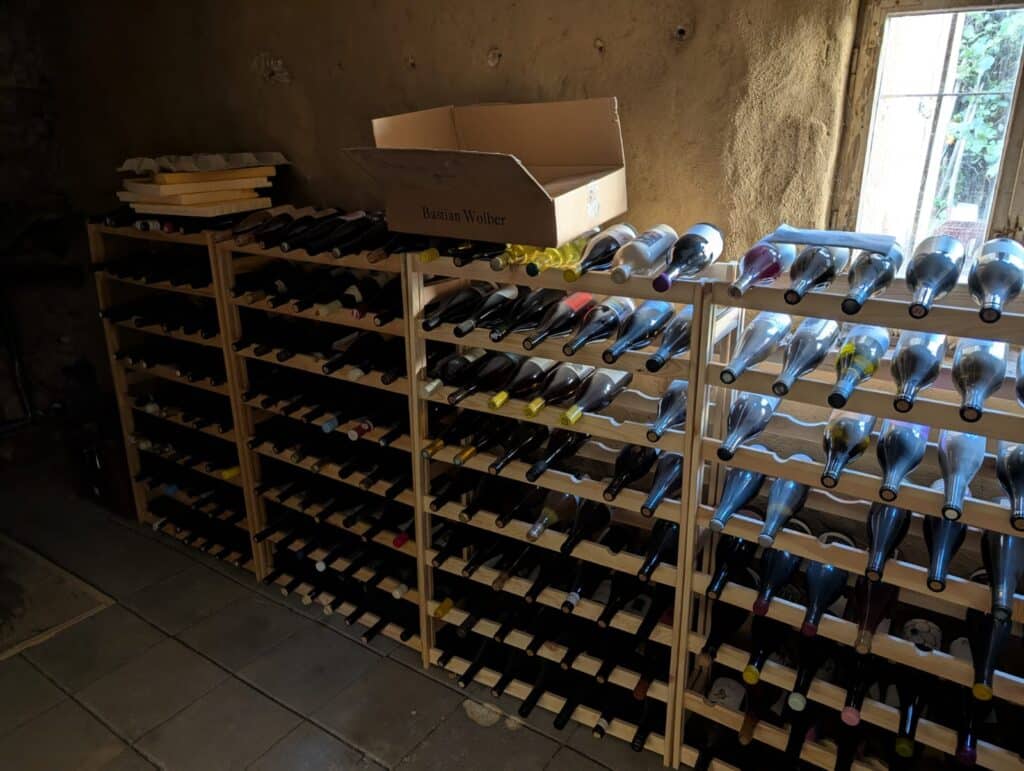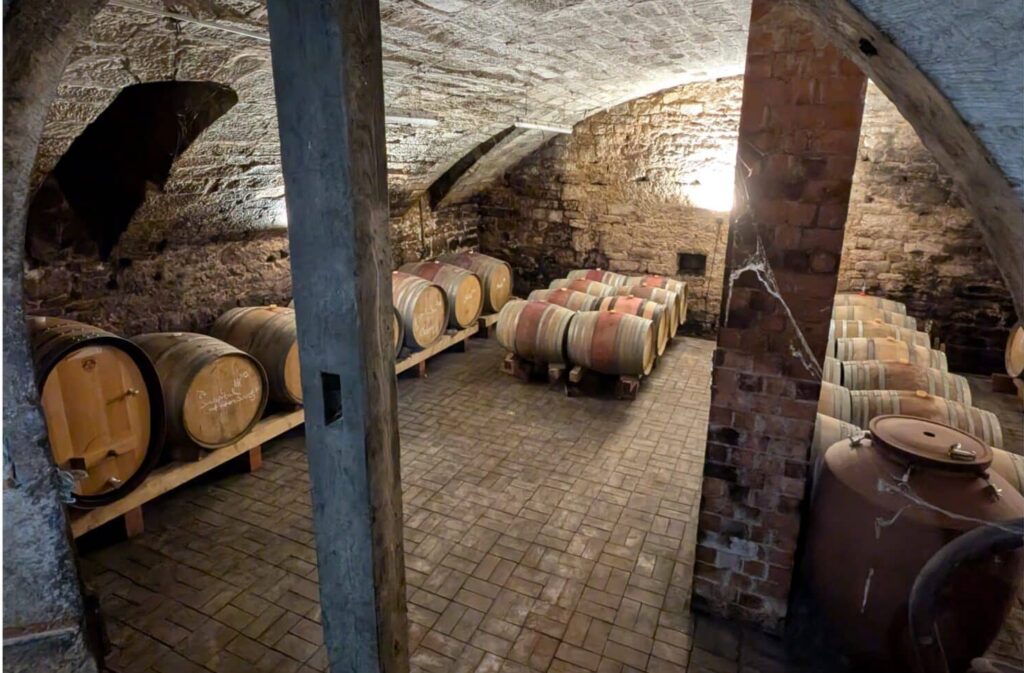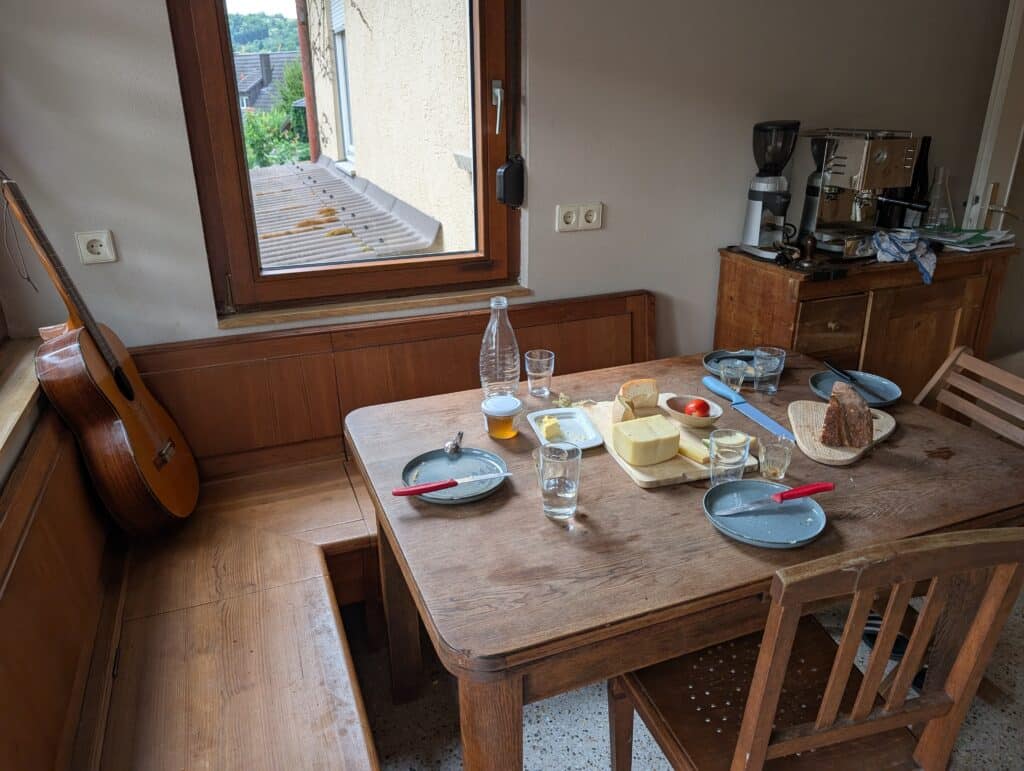Considering that this LEAP adventure was my first time travelling solo, the initial 24 hours were quite the mess. A late bus laden with passengers to Hammersmith meant that I arrived panting at St Pancras and essentially watched my Eurostar train disappear off without me. Thankfully, a quick £44 changing fee had me on the next train to Paris, and I just had to sort myself afterwards. My destination that evening was a hostel in Mannheim, the second largest city in the southwest German state of Baden-Württemberg – just one night before heading off to the winery where I would be spending my next 3 weeks, tending to the vines and warehouses all in preparation for the autumn harvest.
I couldn’t miss seeing the Eiffel Tower before my train through Strasbourg on towards Offenburg (note the spelling change of ‘burg’ with my departure from France), but after the disorganised passport checks on board, I was left delightfully stranded until trains resumed at 4:47 am. Goodbye Mannheim Hostel, hello to a very earnest Frenchman who joined me for a strong cup of coffee, and was full of impressive vegetarian couscous recipes, if my French GCSE serves me correctly. I wished him luck on his fare-dodging to Frankfurt and eventually found myself strolling up the sleepy streets to Kleines Gut (German for ‘little property’) as the church pealed its eighth hour.
This organic winery is owned by a young couple, Daniel and Frederike, with the eldest of their two daughters only just starting kindergarten, so they were more than happy to have an extra pair of hands and set me up in a cosy little caravan at the back of their garden. Meals were plentiful and homely: often bread, pasta or potatoes, cheese and whatever fruit was ripening on the windowsills, though Daniel made it very clear I was to eat and drink whatever my heart desired. In fact, I made the odd grocery trip to the neighbouring town of Esslingen and discovered the wonderful Radler, a German equivalent of shandy.
Over my first breakfast with the family, I discovered I was to be working alongside a Ukrainian, Vadym, and sometimes his mother, both out in the vineyards and within the winery’s courtyard and sheds. Our first job was surprisingly nothing to do with wine, and all to do with sanding down the wooden window shutters and barn doors ready for a new coat of varnish. I was not disappointed in the slightest, spurred on in my manual labour by finally having a use for the pockets on my carpenter jeans! With a paint scraper in my hammer loop, three different flat files in my thigh pocket, and an angle sander clutched tightly in my adequately protected hands, no speck of green paint was safe. Once the dust had settled, I helped the men rig a pulley high in the roof of the largest shed so we could manoeuvre these 1050-litre steel fermentation drums into place, stacked one on top of the other – quite the squeeze.
This work took up the first week of my stay at Kleines Gut, and although I had discovered the place through WWOOF (Willing Workers On Organic Farms), where the expectation was a half-day of work, I relaxed quite happily into the family’s routine. We would breakfast around 8 am, labour steadily in the courtyard until 2 pm, have a nice hot lunch cooked by Frederike and then back to it until Vadym caught the S-Bahn home at 6 pm. Then a simple supper while Dan and Fredi put the kids to bed, and perhaps a homemade glass of wine each out on the patio.
By the start of my second week, I got my first experience out in the hilly vineyards that encompassed the village – rows of terraced fields that looked more like a model from a stop-motion film. I toiled surrounded by Riesling and Chardonnay, pruning overhanging branches that were a waste of the plants’ energy, spraying an orange oil and bicarbonate solution to protect against mildew, and tying new vines securely onto their trellises. In the warehouse by Daniel’s childhood home, I put my German to the test with Frederike directing us how to fold the cardboard boxes, load them with six freshly labelled bottles of rouge and tape them up for their Norwegian destination. On a very muggy Sunday about halfway through my stay, I was even lucky enough to accompany my hosts to Stuttgart’s wine fair where I sampled a very delicious pear cuvée and finally learnt why orange wines are orange: it’s the grape skins.
I spent the last four days of my adventure split evenly between Freiburg and the lake Titisee, both within the Southern Black Forest, and both full of gorgeous sights despite the torrential rain I had for the first three of these days. In the city, I submerged myself deep into German student life, sneaking into the university’s library for some leisurely reading, eating freshly baked pastries while sheet lightning crashed outside, and dancing in an underground techno club until both feet were left with blood blisters. I had my lakeside hostel room blissfully to myself, a perfect base camp for summiting Feldberg on my last full day – the highest peak in Germany outside of the Alps and Bavaria. The way the trees, and the clouds that seemed to spill from them, spread out towards the distant horizon on my ascent will be hard to forget, and all with the gentle sound of cowbells just over the mountain’s crest.
Home safe after a much easier journey back, I am incredibly grateful to this programme for letting me take the plunge into German viticulture, noticeably improving my language skills and developing my knowledge of a field I am both personally interested in and am considering for a future career. I relished working with my hands and feel more confident than ever for subsequent solo ventures – if I can overnight in Offenburg railway station, I can do anything.





